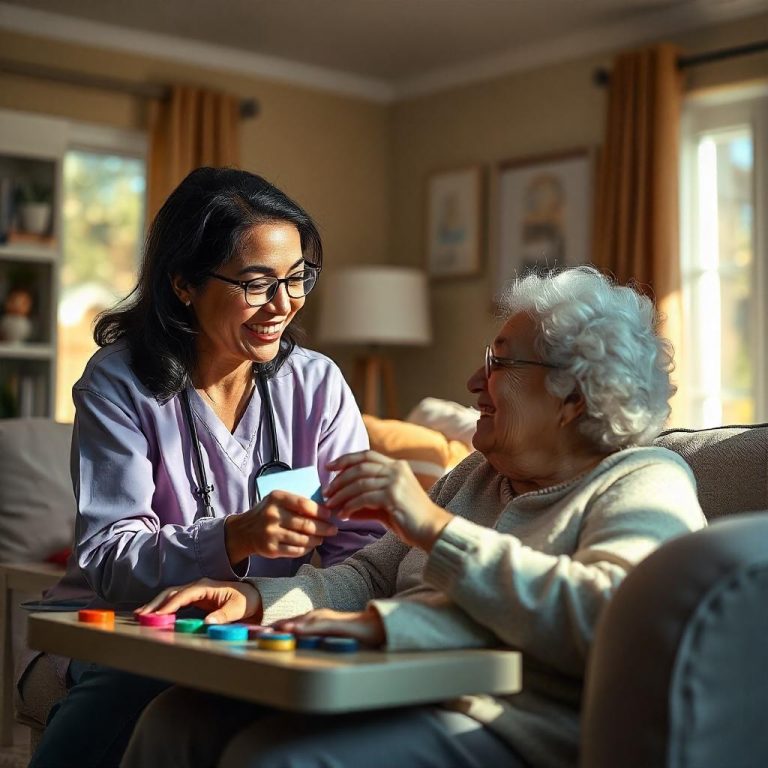Private in-home caregivers offer dedicated, one-on-one support to individuals in need of assistance with daily living activities. Unlike institutionalized care, private caregiving services are provided in the comfort of the client’s home, ensuring a tailored and personalized approach to meeting their unique needs. These caregivers play a vital role in enhancing the quality of life for seniors and individuals with disabilities, promoting independence, and providing peace of mind to families.
Roles and Responsibilities of Private In-Home Caregivers
1. Personal Care Assistance
Private caregivers help clients maintain hygiene and grooming, ensuring their dignity and comfort. Responsibilities include:
- Bathing and Dressing: Assisting with personal hygiene routines, including bathing, dressing, and grooming.
- Toileting Assistance: Helping with restroom needs and ensuring proper cleanliness.
- Mobility Support: Assisting clients in moving around safely, whether walking, transferring between bed and chair, or using mobility aids.
2. Household Management
Private caregivers often take on light housekeeping duties to ensure a clean and organized home environment. These tasks include:
- Cleaning and Laundry: Performing basic household chores such as dusting, vacuuming, washing clothes, and folding laundry.
- Meal Preparation: Preparing nutritious meals tailored to dietary preferences or medical requirements.
- Errands and Shopping: Running errands such as grocery shopping or picking up prescriptions.
3. Companionship
In addition to physical care, private caregivers provide emotional support and social interaction, including:
- Conversation and Activities: Spending quality time engaging in meaningful conversations, hobbies, or recreational activities.
- Encouraging Social Engagement: Helping clients stay connected with family, friends, or community groups.
- Emotional Support: Offering comfort and understanding during challenging times, creating a supportive relationship.
4. Health Monitoring and Medication Assistance
While private caregivers are not licensed medical professionals, they can monitor clients’ general well-being and provide essential reminders, such as:
- Medication Management: Ensuring clients take their medications on time and as prescribed.
- Health Observations: Keeping an eye on any changes in physical or emotional health and reporting concerns to family or healthcare professionals.
- Encouraging Exercise: Assisting with mobility exercises or light physical activities to maintain health and prevent complications.
Benefits of Hiring a Private In-Home Caregiver
- Customized Care Plans
Private caregivers tailor their services to meet the specific needs and preferences of each client, whether it’s part-time assistance or 24/7 care. - Enhanced Comfort and Familiarity
Being cared for in a familiar environment minimizes stress and promotes emotional well-being, especially for seniors or individuals with cognitive impairments. - Improved Quality of Life
Caregivers help clients maintain their independence and dignity by providing support where needed while encouraging self-reliance whenever possible. - Relief for Family Members
Private caregivers provide family members with respite from caregiving duties, ensuring they have time to focus on other responsibilities or simply take a break. - Safe and Secure Living Environment
Caregivers help maintain a safe home by reducing fall risks, managing household tasks, and providing physical assistance when necessary.
Types of Services Offered by Private In-Home Caregivers
Private caregivers offer various levels of care based on the client’s requirements, including:
- Companion Care: Focused on providing social interaction and help with household chores.
- Personal Care: Involves hands-on assistance with personal hygiene, mobility, and daily activities.
- Specialized Care: Includes caregiving for individuals with conditions such as dementia, Parkinson’s disease, or recovery after surgery.
- Respite Care: Temporary relief for family caregivers who need a short-term break.
Qualifications of a Private In-Home Caregiver
Private caregivers are typically trained in caregiving techniques and may possess certifications such as:
- CPR and First Aid: Ensuring preparedness to handle medical emergencies.
- Specialized Training: Skills in managing conditions like Alzheimer’s, diabetes, or post-operative care.
- Strong Communication Skills: Essential for understanding client needs and effectively coordinating with families and healthcare providers.
- Empathy and Patience: Vital traits for building trust and providing compassionate care.
Choosing the Right Private In-Home Caregiver
When hiring a private in-home caregiver, families should consider the following steps:
- Conduct Background Checks: Verify the caregiver’s qualifications, certifications, and past experience.
- Interview Candidates: Ask about their caregiving philosophy, experience with similar clients, and availability.
- References: Request recommendations from previous clients or caregiving agencies.
- Trial Period: Start with a short-term arrangement to evaluate compatibility before committing to long-term care.
Who Benefits from Private In-Home Caregiving?
Private in-home caregivers serve a diverse range of clients, including:
- Seniors who prefer to age in place but need assistance with daily activities.
- Individuals recovering from surgery or illness.
- People with disabilities or chronic conditions requiring consistent care.
- Families seeking additional support to balance caregiving responsibilities.
Private in-home caregivers offer a comprehensive, personalized solution for individuals and families seeking reliable support in a compassionate and familiar environment. By fostering independence, providing physical assistance, and building emotional connections, these professionals play a critical role in ensuring clients live with dignity and comfort.






